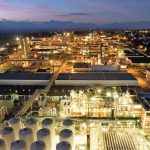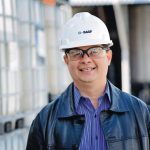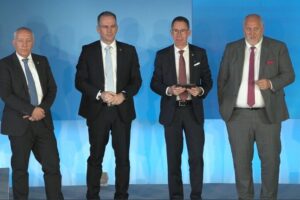BASF has been present in Brazil for a whole century and for over half that time it has also manufactured in the country. Business is going well for the chemical company. This success is backed up by a clever strategy, the latest technology – and strong partners like Endress+Hauser supporting both.
Pipes and steel structures wind across an area covering the size of fifteen football pitches; tanks and reactors fill the skyline – the tallest as high as a tower block. A plant with gigantic dimensions is slowly emerging in Camaçari. “Once everything is up and running here, this will be BASF’s largest production site in the whole of South America”, says Project Director Bernd Eidt.
The chemicals group is building an integrated plant for the production of acrylic acid in north-eastern Brazil. BASF is investing 500 million euros in this facility at the petrochemical hub of Camaçari close to the coastal town of Salvador da Bahia, nearly a thousand miles north-east of São Paulo. For BASF, this is the biggest project on the entire continent in more than a hundred years. The location was chosen because of the availability of propene, a gas extracted virtually next door at the mineral oil refinery of Braskem, a strategic partner.
To be precise, BASF is erecting not one but three plants at Camaçari plus a tank farm and infrastructure. The focus will be on the manufacture of acrylic acid, which is the base element for a number of products: acrylic resins for paints and varnishes, glues and adhesives, textiles, chemicals for the construction industry – and above all superabsorbent polymers able to absorb liquid many times their own weight.
Superabsorbent materials are used in babies’ nappies as well as other hygiene and body care products. “That means we’re only one step away from the finished goods in the value chain”, Eidt stresses. “We supply our customers not only with standard commodities but with highly developed materials.” This makes BASF an important strategic partner for downstream industries – and safeguards its leading position in the field of acrylic compounds.
That’s not the only feature which makes this project unique: BASF is actually building a second acrylic acid complex in China parallel to the one in Brazil. Despite certain adaptations to comply with local requirements and standards, both plants are exactly equivalent in technical terms. “The facilities in Camaçari and Nanjing are like identical twins”, Eidt explains. “This gives us substantial synergy effects as regards both engineering and sourcing.”
The process measurement technology for the two plants comes from a single source: Endress+Hauser is supplying over 10,000 instruments, including third-party devices. “It was important for us to find a supplier who is capable of handling such a global project professionally”, Eidt continues. Endress+Hauser has demonstrated that capability in a number of major projects already completed for BASF. “What also helps is that a strategic account manager coordinates regional activities around the globe”.
Profound understanding of processes
“The process measurement technology is an essential part of our plants – like the nerves in the human body”, says Eidt. “Endress+Hauser’s engineers have a profound understanding of the requirements of our processes. They always find the optimum solution for our tasks.”
What’s more, BASF expects strong support at all times – not only during installation and commissioning but also later during operation. Competent on-site service was an important factor in BASF’s decision. The timeline for the acrylic acid plant is ambitious; the ability to deliver all devices and components punctually is a must. Yet equally important is compliance with BASF’s environmental, health and safety stand-ards – “added value for the whole company and an integral part of our project”, Eidt emphasises. “Our targets are all based on safety first.” By the beginning of 2014, the acrylic complex construction site had recorded more than five million working hours without a single day lost. “High quality equipment plus trained and committed people are the equation for this successful result”, the Project Director concludes.
Complexity under control
Camaçari may be BASF’s biggest investment in Brazil by far but it is certainly not the only one. The Guaratinguetá site also benefits from the chemical group’s growth strategy. New plants for crop protection agents and acrylic paints, designed to process primary products from Camaçari, are currently being built there. A production line for plastic absorbers for the automotive industry is also being relocated to this facility.
Guaratinguetá is BASF’s first production site in Brazil – “and today the most complex”, adds Antonio Carlos Cipolli Fernandes. As Engineering Manager for South America, he is responsible not just for the site but for the group’s amassed operations throughout the continent. In Guaratinguetá, 120 miles north-east of São Paulo, BASF makes 1500 different prod-ucts at more than a dozen plants. Since the strategies of each business unit differ substantially, the operating and maintenance demands are especially high.
One of BASF’s manufacturing focuses in Guaratinguetá is polyurethane-based products such as absorbers or insulating materials; another is disperse dyes based on acrylic. Considerable flexibility is called for here. “We make as many as 80 different paints and dispersion products”, says Cipolli. “Five to ten percent of the formulations change every year.” Orders often arrive at short notice. “To comply with our customers’ requests, we can change our production schedules several times a day if necessary.”
To an ever-increasing degree, BASF makes not only chemicals but also sophisticated products such as absorbers for car manufacturers. To do this, the company must master more and more steps in the value-added chain. “Of course, we equip our new production lines with the very latest measurement technology”, Cipolli remarks. Virtually every device is supplied by Endress+Hauser; the field instruments and control systems communicate digitally using the Hart protocol.
Far-sighted strategy
Endress+Hauser’s products are recognised as technically superior and totally reliable. “They are easy to configure and operate.” The Head of Engineering also sees major potential in the standardisation of measurement technology. “We can save a lot of money if we only have to train our people on one system”, Cipolli be- lieves. In the medium term, BASF will be able to bundle its spare parts management in a single plant because far fewer parts need to be kept in stock.
The biggest step forward Cipolli expects involves analysing the multitude of signals and information that today’s smart measurement instruments deliver in addition to the actual measured values. “Our aim is to move from preventative maintenance to predictive maintenance”, he announces. “The instrument will then tell us itself when it needs to be serviced or replaced.” He is convinced that the integration of device information into BASF’s enterprise resource planning system will offer even more opportunities.
Powerful and efficient measurement and automation technology of this kind has its price, yet the crucial aspect for Cipolli is the total cost of ownership, covering all costs over the entire lifecycle: “If we have to shut down a plant unscheduled, things become really expensive.” BASF has made this approach its business principle. The company focuses not only on the original investment in a plant but also increasingly on operating and maintenance expenses.
“We have a tool which gives us hard and fast figures”, says Cipolli. The Head of Engineering is insistent that this way of looking at things will take the company forward: “We consider not only the initial costs but also the follow-up costs. This allows us to compare totally different plants and locations and to learn from each other.”
cpp-net.com/0115400
Share:









